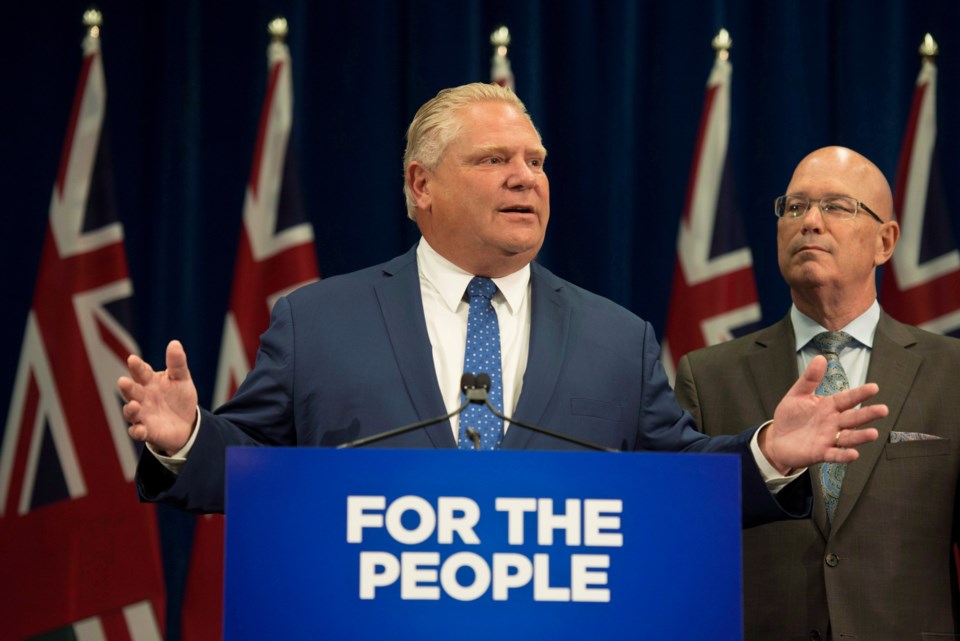Scrutiny of Housing Minister Steve Clark's chief of staff may just be beginning.
Ontario's integrity commissioner's office is considering investigating him, its spokesperson confirmed. Premier Doug Ford's office requested the investigation, making good on one of the recommendations the premier promised to adopt from the explosive report on the Greenbelt land swap that Auditor General Bonnie Lysyk published on Wednesday.
"The Office (of the Integrity Commissioner of Ontario) can confirm receipt of a request from the Premier’s Office regarding the recommendation you have referenced," said Michelle Renaud, the spokesperson for the commissioner's office in an email. "The request is under review."
Ryan Amato, Clark's chief of staff, was a central figure in the 95-page special report that Lysyk's office released after an almost seven-month investigation.
On Nov. 4, the Progressive Conservative government announced its intention to remove 7,400 acres of land in 15 different parcels from the Greenbelt. It finalized the removal of these lands, and the addition of 9,400 acres to the Greenbelt from elsewhere, in December.
The move has been tremendously controversial ever since it was announced. Ford and Clark have repeatedly defended it as being crucial to relieving the province's shortage of homes and the housing affordability crisis. The government intends for 50,000 homes to be built on the newly developable lands.
In her audit, Lysyk cited a report by a government-appointed task force that it drew its main housing target — having 1.5 million new homes built in Ontario by 2031 — as evidence that removing land from the Greenbelt was not needed to reach its goal.
Amato had “substantial control” over the process of determining which land would be removed from the Greenbelt, the provincial auditor wrote in her report.
Subtle steps were taken within the government over the months following the June 2, 2022 election, in which Ford's Progressive Conservatives were re-elected to a second majority, setting the stage for the government to make changes to the Greenbelt.
On Sept. 14, the Building Industry and Land Development Association (BILD), an industry group representing developers and others in construction in the Greater Toronto Area, held its chair's dinner. Two developers gave Amato packages at the event containing information about two land sites that would later be removed from the Greenbelt, according to Lysyk's report. Shortly after, one of these developers provided Amato with information about three more sites that would months later be taken out of the Greenbelt.
Land in the five sites that Amato received from these developers accounted for 92 per cent of the total area the Ford government took out of the province's signature protected area last fall.
On Sept. 16, Amato informed public servants in the Ministry of Municipal Affairs and Housing that the Ford government wanted to consult on removing specific sites from the Greenbelt, Lysyk's report said. The three priority sites he identified at this time were among the five the developers from the BILD dinner gave him information about.
During early October, six public servants in the Ministry of Municipal Affairs and Housing are appointed to a "Greenbelt Project Team" that reported to Amato, the auditor found. They're all required to sign confidentiality agreements. By early November, the 15 parcels of land being removed from the Greenbelt had been decided, 14 of which Amato first proposed, Lysyk's report said.
In total, these lands' values could balloon by upwards of $8.3 billion by being removed from the Greenbelt for development, Lysyk said on Wednesday, citing a years-old estimate from the Municipal Property Assessment Corporation.
"We found that how the land sites were selected was not transparent, fair, objective, or fully informed," the auditor wrote in the reflections section of her report.
One of Lysyk's 15 recommendations in her report was that "a request be made to the Integrity Commissioner of Ontario to determine whether the chief of staff to the minister of municipal affairs and housing acted contrary to the requirements of the Public Service of Ontario Act, 2006 with respect to his liaisons with land developers and their representatives."
In response to the auditor general's report, Ford promised that the government would implement 14 of the recommendations. The lone suggestion that Ford's government didn't agree to act on was to revisit the 2022 land removals.
Integrity Commissioner J. David Wake is already undergoing one investigation based on the Greenbelt land swap. Its focus is on Clark, the housing minister.
"Suspension and dismissal" are among the penalties the integrity commissioner can give under the Public Service of Ontario Act, which is what it could investigate Amato under.




